The Writing Life
31 Oct 2014
Twenty-five authors describe their writing habits.
Adrian Addison
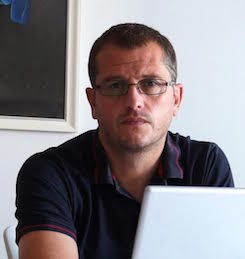
For me, it is a race. A race to get the first draft done (not even the dog gets to see this draft). I have to out-run that voice in my head, that bastard who tells me ‘you’re shit - a fraud. Who the f’k you think you are, Shakespeare? Go to the pub, you moron, the football’s on.’ It’s like a sprint from tree to tree, day to day - a heavy man running naked, sometimes over hot and open ground - with predators nearby, all smelling The Fear. ‘Run, you bastard, run!’ Across that white page. But, ah but, when there IS a finished draft, it cannot - cannot - be killed. It exists. It might well be shit, probably will be - probably SHOULD be - unless you just happen to be Jack Kerouac, and have a scroll handy (even that story is a myth, really). It exists.
The rest is ‘just’ editing (maybe measure it like cooking rice, three parts re-writing and editing to one part scribbling). If I have a project, and a deadline, the alarm goes off at just after 4am (I always set an alarm at 0403 or 0407 - or whatever time - I love those stolen minutes). I am not, by nature, an early riser - I am a lazy, lazy man. So, there is nothing pisses me off more than having gotten up at 4am and having produced nothing. It’s a trick. Set the coffee away. Kitchen table. A kitchen chair, no cushion. Feet up on the chair on the other side of the table. Silly DJ headphones. Music - something that requires no thought, no processing, something I have heard a million times (Beatles, Stones, the Stone Roses, U2, or my own playlist - whatever, it doesn’t matter). It is just a mental cushion to sit my brain on. Growl and grown, hammer those keys. Don’t come anywhere near me. Re-write? No. There’ll be lots of that - later. Get that golden draft down, it’s a bag of magic. And she is the only draft that, truly, belongs only to you.
Alan Baker
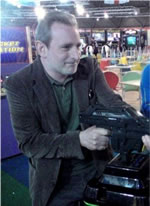
Like many (if not most) writers, I can’t afford to do it fulltime, so I start very early in the morning before heading out to my stultifying day job to begin the daily exchange of small pieces of my soul for rent money. Typically I get up at 3am and drink a pint of very strong coffee while trying to free myself from the clutches of Facebook and io9. Then, at around 3.30, I start to get some words down. Three hours (and too many cigarettes) later, it’s into the shower and off to work. I try to write 1,000 words during this time, and often succeed. It’s a nice, plump figure which allows time the next morning to read over what I’ve written the day before and do some on-the-fly editing. Hemingway said (I think in A Moveable Feast) that you should always do this to get yourself back into the piece you’re writing, and who am I to argue? I write at my desk in the bedroom of my small but immaculate apartment in Florida; there’s a lake outside, but it’s artificial and therefore not particularly interesting or inspiring. On weekends I can get 2 – 3,000 words done each day, and usually feel very pleased with myself.
Sometimes, music helps, and sometimes it doesn’t. When it does, I usually go for ambient and electronic (early Tangerine Dream is a particular favourite), although I’m also partial to a bit of Arvo Pärt. The music MUST be instrumental; I find lyrics way too distracting. I have no idea how Stephen King manages to write with hard rock blaring out at full volume – but each to his own, I guess. I write on the computer rather than longhand, with two fingers. I never write in manuscript format: somehow, it just doesn’t feel right; double spacing makes the text look too diffuse, too nebulous somehow. Instead, I format my Word document to look exactly like the pages of a published book. This may sound odd or trivial, but it seems to open a psychological wormhole to the finished product, and I’m all for whatever mental trick will get me to the end of the project. Right, now I’m off to spend eight hours transcribing sales reports. I wonder how many donuts have been sold in Arkansas this month. I have little doubt that the answer will be forthcoming.
Lynne Barrett-Lee
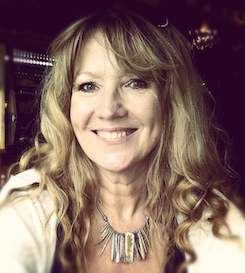
I’m a garrulous, energetic, outgoing person, so ‘being a writer’ is an astoundingly bad choice of career. Forget that my very soul sings at the thought that I am living my dream, the execution of it causes all sorts of headaches, both practical and emotional. For starters, I really don’t like being alone, so, to that end, I have accessorised my working life with, variously, the collected works of the Manic Street Preachers (maximum volume) a LOT of Tchaikovsky, Homes Under the Hammer, Bargain Hunt, and – for a spell at least – Flog It! Though Paul Martin in close proximity has proved to be too distracting. Now I’m oldish, I also have two cats; as everyone knows, two cats are almost always better than one, as their various spats add an extra dimension to the working day, not least because they so often distribute all my paperwork.
I used to have a dedicated writing room, but since I became a disciple of Apple, I write at the kitchen table, on my Mac, and it’s really all I need. The well-appointed office is therefore scheduled for a make-over as an ‘artist’s studio slash library slash post-menopausal crafting facility’ in 2016, or when I sell some film rights, whichever is the sooner. In truth, however, I can write anywhere. When I achieve what is so perfectly described as ‘flow’ I could be in Bombay or Bognor, Amsterdam or Antigua - and as my husband often zips around the globe attending scientific conferences, in pretty cities, this is an EXTREMELY BIG PLUS. If I’m at home, though, it’s a boring but productive routine. I get up early, I start work, I may or may not put some clothes on, and I write pretty consistently till it’s too dark to see, corralled by both a debilitating and unshakeable work ethic and an excitement that I don’t think will every quite leave me. A day off, in my heart, is a day slightly less good than a day when I get something written. I am, in short, very, very lucky.
Duncan Campbell
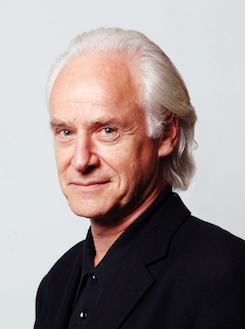
There is a cat on the window-sill in front of me as I sit at my desk with my lap-top open in front of me so obviously I have to see what it is that is attracting its attention. Now it wants back inside so obviously I have to open the window. Ah, distraction, distraction. While working on my current project, a history of crime reporting called We’ll All Be Murdered In Our Beds, I came across the fact that one illustrious former crime reporter, Edgar Wallace, who was, of course, much better known as a thriller writer, could knock out a book in three days. Three days! We should all have a photo of Edgar in our line of sight as we start our day. A good friend, the late Jim McClure, who won gold and silver daggers from the Crime Writers’ Association, was another role model in application. Despite a full-time job as a journalist and three children he was able to write a beautifully constructed entire novel in fifteen days. Fifteen days! It must have been the Scottish Calvinist genes.
So how does one accomplish such a Stakhanovite writing ethic? When I wrote my first book in the seventies, I used to type (remember typewriters?) through the night with LPs (remember LPs?) as an accompaniment. Now I have to get up early, resist spending more than an hour going through the news and get cracking. I aim at a normal working day and week-ends off with just background reading to be done. It’s still only 9.30 am and it’s all going terrifically well but now the cat wants to get out again.
Roger Crowley

Because I write history books I do masses of pre-reading and note taking, so that when it comes to the actual thing, I need a lot of space – desk and floor are strewn with notes, notebooks, maps and source material. I tend to write a very rough outline by hand for each chapter then turn to the laptop. If it’s not going well I’ll write more by hand – handwriting gives permission to get something down. I like to have an uninterrupted run at a chapter - it’s harder picking up and putting down work - so weekends may be included, then have a short breather before tackling the next one. I try to produce a very polished first draft. I’m a morning person – sometimes starting very early – and I can’t write for more than about three hours a day, not more than 500 words probably. I make rough long term work plans looking several months ahead. I’m not too fussy where I write – I’ve alternated between two rooms over the years, one allows me to stare out of window (better for summer), the other’s almost subterranean (snug in winter). I don’t need silence but I find music distracting. When I want a break I reward myself with a game of patience, a walk round the garden or a cup of coffee. I don’t expect to heavily redraft but I do end up having to do a lot of fact checking at the end. I usually feel pretty exhausted by the time the book is done.
Emma Donnan
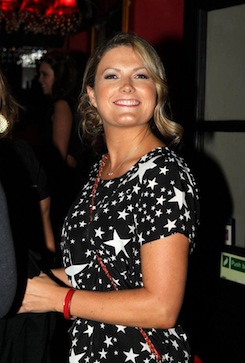
I have a beautiful new mahogany writing desk in the corner of my lounge, with previous books I have written along one side to remind me of what I’ve achieved so far, and other books I admire along the other, for inspiration. Sadly despite my best intentions, you won’t find me working there. Instead, writing time tends to see me tucked up in bed in my comfiest onesie, with my laptop on my knee and endless diet coke cans to hand – or at best, my duvet and I may have made it to the sofa. I am an all-or-nothing writer – when I take on a project, everything else is forgotten, and all I do is write from the minute I get up (or waken, getting up as explained, not always being on the cards). I am not one of those people who spends weeks planning, instead getting stuck in as soon as I have done the first interview with my subject. Inevitably very little of those first writing sessions ever remain in the final copy, but it gets things moving.
The way I work often means I am still writing in the middle of the night, and have been known to churn out as many as 20,000 words in a 24 hour period. Not that they are always 20,000 good words, but by being on the page they make the task ahead instantly less daunting! I work on a system of get the words and thoughts down while my mind is fully focused, and then edit them later. My first draft is always littered with highlighted sections I knew would need work as I wrote them, and strings of question marks where I didn’t have the necessary facts to hand. But I refuse to break the flow then and there to hunt out what I need – that can happen later. I’ll frequently take a break to talk the next section of the book through with my boyfriend. He doesn’t need to actually say anything, just telling the story out loud often helps to get my thoughts straight on what the most interesting or emotive angle is.
Then the most crucial rule is no matter what time I finish – 5am included – a glass of wine rounds the day off, while focusing on something else for half hour to wind down. Without that my mind absolutely can’t switch off from the topic and any chance of sleep to be ready for the next day can be forgotten.
Perhaps not the healthiest of writing routines, but it works for me!
Eleanor Fitzsimons
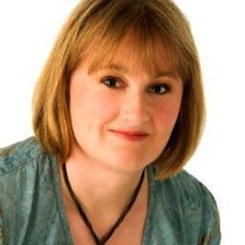
For Christmas last year I got a lovely and very expensive Mac-Book Pro, but I keep gravitating back to the battered old PC in the study (don’t tell my husband). I’m typing this on it right now. I think it’s partly because I feel a little intimidated by the shiny new beast, but also because I haven’t managed to connect it to the printer yet and I like to do my final proofreading on paper (apologies for all the deforestation). I also read my drafts aloud, which is my absolute number one piece of advice for all writers – it’s the only way to get the rhythm and flow right - but still makes me feel like a crazed lunatic at the time. I assemble a skeleton made up of bony chapters before fleshing them out with research – lots and lots of research. Then I knock each chapter into shape, adding extra little nuggets of information as I go along. Sometimes I can get a bit obsessed with chasing the tiniest of facts down labyrinthine archival tunnels. Today, I spent several hours searching for a tangential and obscure journal article from 1878 just so I could add one sentence to Chapter Seven; it was worth it. I revise and rewrite and proofread until I can’t stand to look at the damn thing anymore and want to chuck the whole lot on the fire, and then I read it again. I was delighted when I learned that Harper Lee threw To Kill A Mockingbird out of the window of her apartment one night, only to rush down several flights of stairs to retrieve it. I can relate to that. On a good day, I read draft fifteen or so and think, ‘maybe this isn’t too bad’.
Adrian Gilbert
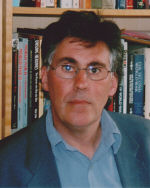
If ‘how I write’ is framed as a question, then the answer is, ‘with difficulty’. Most authors will agree that writing is a difficult, often painful process – even for the fairly straightforward military history books that I produce. Just getting the words out in the proper order can sometimes seem a herculean task, with procrastination and distraction your ever-present companions. The advent of the internet has only made matters worse; never has anything but the matter in hand seemed so interesting and so demanding of your time.
On the practical side, having done my research I work out a fairly detailed plan for each chapter, which then gives me a basic structure to begin writing. On a full writing day I aim to get 1200 words or so on paper; less than a 1000 counts as a weak performance. The key is to get a decent rhythm going, as one good day’s work tends to encourage another and so on. Having finished a chapter, I’ll read it through and do a quick edit before putting it aside, returning at a later date when the next round of editing begins.
I’m fortunate in having my own study, which allows me some essential seclusion from what’s going on around, as well as a chance spread out my papers without having to worry about tidying anything away. I write at a desk (onto an ageing Apple Mac) and have the luxury of a nice view from my window, which may be a source of inspiration but more probably is just another distraction.
Glyn Gowans
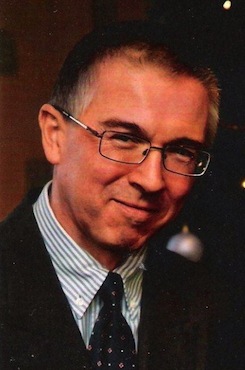
I live in a pleasant flat in Witham. Most days after breakfast, I enter my ‘study’ around 7:15, switch on the computer, and then spend an hour perusing the BBC News, Guardian, Telegraph, Independent and Reuters websites. I also reply to any e-mails which are urgent or need only a brief reply; I leave the rest to the evening. I aim to get cracking on the current book by 9:30; my most productive period is 10:00 to 12:30, when, unless it’s pouring with rain, I go for an hour’s brisk walk. After a light lunch, it’s back to the computer until six, when I start preparing dinner and enjoy an aperitif; I find cooking a great way to unwind. Evenings are for relaxing – but that can include research, which I love.
Despite six homes in eighteen years, I’ve always written in a dedicated room on my own. I need peace, good lighting, a decent desk, a comfortable chair, warmth, shelving for my books and research materials – and tidiness! I love music but cannot write with it in the background: I just end up daydreaming. My homes in Mallorca had heavenly views, but, while providing inspiration, the countryside was cacophonous: the neighbours’ tractors and rotavators were a nightmare. But the worst noise was the barking of their chained dogs. Witham has proved far quieter! When I first started writing, I scoffed at technology and used treasured fountain pens for first drafts. It took a few years for my partner to convince me of a PC’s merits, albeit I still make manuscript research notes. I revise many times; years of legal practise incite perfectionism. From the outset with the Duke of Kent biography, I’ve kept Timeline and Dramatis Personae files. It might seem tedious to update these constantly, but they generate valuable cross-referencing research tools. For security, I have two copies of all files on memory sticks. Updated at least every few days, I keep them in separate locations. You can’t be too careful!
Ian Graham
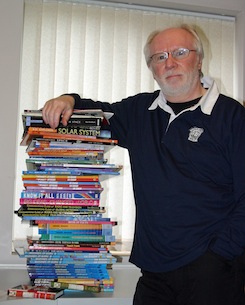
I’ve been a full-time writer all my working life, first in magazines and then in books. For most of that time I’ve been a freelance, so I’ve worked at home for more than 30 years. I work in a small home office. A TV set at the end of my desk provides background noise. Having taken a postgrad course in journalism after my physics degree, I can touch type and use shorthand – both very useful. Once I have a have a manuscript deadline, I divide the amount of work by the number of days to give me a work target for each day. I tend to work all day every day, seven days a week, until the job’s done. When the work’s going well, I’m oblivious to the hours flying by, but when the flow falters, it’s more difficult to resist the countless distractions that demand attention.
I go through a manuscript several times, revising it in a different way each time. On the first read-through, I search for typos, grammatical errors, factual errors, dates that don’t make sense, inconsistencies in spellings and so on. On the next read-through, I concentrate on improving the story-telling so that the text flows more smoothly and it’s a better read. Then, as I’ve worked as a magazine editor, I read the text as an editor might. This often reveals parts that need more work, perhaps more explanation, and others that can be ditched altogether because they interrupt the story. After a final read, it’s off to the publisher. On to the next job!
Caro Handley
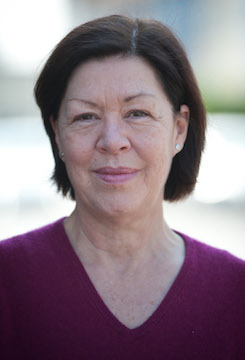
I have a small study at the back of our house on the first floor. The walls are sky blue and the window looks out on our small garden with its over-large fig tree. I chart not just the seasons but the progress of my books, thoughts and working life by that tree. The fig is the closest thing I have to a workplace companion. I sit facing my computer screen, the wall behind it covered in photos, pictures, postcards and sayings that I’ve liked over the years. The window is to my right, and I swivel round on my chair and stare out of it whenever I’m thinking, puzzling or waiting for inspiration. The window looks west, so I can watch the sun set behind the fig on winter afternoons.
The length of my working day varies, depending on deadlines, number of projects on the go and family demands. Mostly I work ten to six but at times it can be six in the morning till ten at night. I like having to pull out all the stops and go for it. When time is tight I can produce 5000 words in a day, more is a struggle and it’s usually half that. I write flat-out and then read it through the next day and make changes, cutting back where I’ve over-written and improving the shape and feel. At the start of a book I resort to endless distractions – another cup of tea, put washing in, write a few lists, make a call and on and on until I finally make a deal with myself to just put something on paper. Once I do I’ll keep going. I need relative peace. I don’t listen to music, but I like opening the window and hearing the sounds from outside; birds, traffic, dogs, ice-cream vans. If I’m working in the evening I’ll do it with a glass of wine.
Paddy Hayes
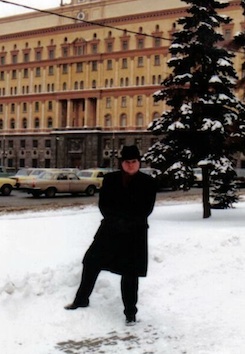
To get decent words down on paper takes every bit of energy I possess so while I’m not generally an early riser I am when it comes to my writing. While in writing mode (and only then) I am a lark, up with the dawn, writing away on my PC in my library/study (man-cave) overlooking the back garden of our suburban home in Dublin. Five hours (with a one hour break) is about as long as I tend to write for at a time…seven to midday…eight to one, whatever before the battery is drained. Sometimes I get a late afternoon re-charge but use that mainly for revision and for research both of which I conduct endlessly.
I work to an outline chapter plan, sketching out the life of the subject (in the case of a biography) or the main storyline in a work of fiction. Unlike some authors my approach is linear both in terms of how I will write it and how the story will unfold for the reader.
Once my overall chapter plan is in place I think about the content of the next chapter to be written. First I need to determine the plan of attack, how best to tell the story in order to make the storytelling as compelling as possible. I also need to figure out how to end the chapter so it works as a piece, advances the narrative and satisfies the reader. Getting this right requires long walks, thinking, mulling, rehearsing and generally chewing it over. Then I write. A fairly complex chapter might take two/four weeks to complete, working my four/five hours a day, every day, unless I’m travelling or otherwise O/S.
As far as revising goes, each time I log on to the PC I start at the beginning of the current chapter and work my way through to the place I last finished, revising as I go before carrying the story forward. That way I get to read and review everything I’ve written, maybe a score or more times.
Two years after I start I hope to be finished.
Mary Hollingsworth
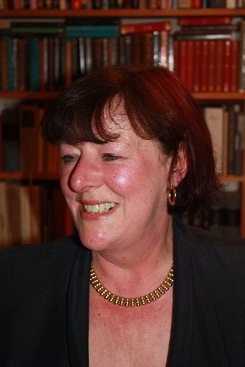
Once I started writing, I realised that I would have to leave London for somewhere very quiet: my first escape was to a converted haybarn in a Tuscan olive grove, which was ideal. I find it impossible to combine a regular social life with the strict routine I need in order to write - I also realized, after spending an entire morning cleaning behind the cooker, that a cleaner was necessary to avoid that particularly compelling distraction mechanism.
My routine starts before 6am, when I take the dog for a walk and think about what I am going to do that day. I spend the morning writing, carrying on until 2pm, or even 3pm if everything is going well. After lunch I garden for an hour, therapeutic after a morning staring at a computer screen and, best of all, a small sense of achievement even if the morning has been unproductive. Then I read something entirely unconnected with work for an hour or so - I am currently re-reading Trollope, very relaxing. I try to work again 5pm to 6.30pm but this is usually more clerical than creative. I need a very quiet evening to wind down, ready for the next day. The routine sounds dull but I enjoy the challenge of writing. Being a bit of a party animal, I also enjoy celebrating the end of a book with a return to sociability.
Kris Hollington

I write anytime, anywhere and anyhow. I’m always armed with an 11” MacBook Air (and charger) along with at least two moleskins and several fine-nibbed pens. Substantial parts of my books have been written in waiting rooms, airplanes, trains (an especial favourite), cars (trickier) and buses (also tricky; I once fell off my seat during a sharp turn in Turin, resulting in a tornado of papers, pens, computer accessories and limbs). One urgent ghosting job was concluded during a wedding in Frankfurt (we weren’t close), which also happened to be taking place during the book fair. I’m a great believer in making the most of my time.
Depending on the book, I write about 1,500 to 4,000 words per day, sometimes to music (recent books have involved the use of Bon Iver, The National and Belong) but I also enjoy the background noises of airports and train stations and another favourite album of mine is Airport Symphony. I have a small study at home but I’m rarely in it as my work and life tends to involve a fair bit travelling. When I’m close to a deadline I have some favourite cafés I head for (Starbucks Liverpool Street, at the back of the main concourse, practically below ground has proved reliable in stimulating brain activity) but generally the world fades into the background once I get going, so anywhere works for me.
Rodri Jeffreys-Jones
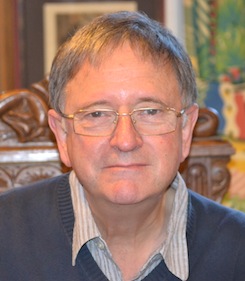
How I write has to do in the first place with those who taught me. Miss Enid Jones was my English teacher in Ysgol Ardudwy, a West Wales comprehensive school. She also taught and impressed Philip Pullman. Miss Jones told me to write short sentences and to strip out the adjectives. Another influence was the African American historian John Hope Franklin, who turned up one day at Aberystwyth University. Instead of instructing us undergraduates about black history on which he was an authority, told us how to become our own intellectual adversaries as a way of refining the truth. At Cambridge University, my Ph.D. supervisor Sir Denis Brogan barked out the instruction that I concentrate on no more than one major project at a time. All these things stuck in my mind.
Then there is the question of where one writes. For me it starts in bed in the small hours, when a thought or a phrase gets me up to write it down lest I forget. It continues in a paperless environment, the shower. After breakfast, newspaper, grandchildren and other episodes, to my study. Facing North in a leafy suburb, it’s unforgivingly devoid of impediments to creativity.Little things to the rescue. An email can be so seductive. Then reread yesterday’s output, review today’s writing plan, forge ahead on the keyboard, regroup for the next day checking historical data and planning tomorrow’s progress. Writing is a job, like any other.
Rachel Kelly
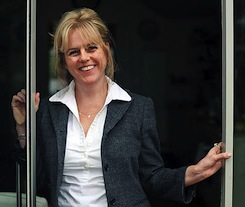
What follows is my ideal working day. Often it is interrupted by dogs, children, holidays and life. But my perfect routine recreates the pattern I used to follow when I was a Times reporter. I drop the children uncomplainingly at school, pick up a coffee (cappuccino with an extra shot), and read the papers (Times, Telegraph and Mail). By ten I start work in a small first floor study off our bedroom. Work is a mixture of research, keeping up with my website, readers, and social media as well as writing. About half my time is straight writing, done in silence, and this tends to happen in the morning. By the afternoon I find myself less creative and the writing sloppier. My only distraction is our wheaten terrier Sammy who sits in an arm-chair in our bedroom next door. The study window overlooks a church and trees, but I keep the blind down for fear of being distracted. I use a kneeling chair to try and avoid a bad back, but I still find my neck aches and I break regularly to do stretching exercises. I work till lunch around one, breaking for 45 minutes, soup and something fun to read like Private Eye. I then work till 3.30 pm, do the school run, and hope to perhaps squeeze in another hour of work – typically phone calls – between homework, walking Sammy and making supper. I normally stop around six thirty, only working later if I’m on a deadline. As a former journalist, I can produce 2,000 words a day if need be, but they would not be to a standard that I would want published in a book. I used to rely on sub-editors and editors to improve my copy on The Times and my work always benefits from other readers. Typically my husband is the first to read a draft. He luckily is as good an editor as those I benefitted from at The Times
.
Shannon Kyle
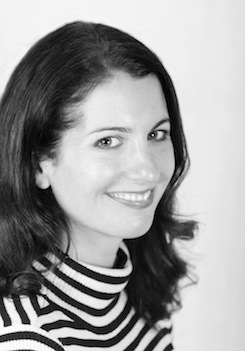
Whenever I start writing a book the famous Nelson Mandela quote never fails to spring to mind: ‘It always seems impossible until it’s done.’ Projects and deadlines vary but inevitably I don’t have the luxury of time to procrastinate. ‘Writer’s block’ just means a lack of motivation to me. Someone once suggested the best way of alleviating this is to place your latest unpaid bill by your laptop; this works. Sometimes I go for a five mile morning run before settling down, other times I get straight out of bed and start typing in my kitchen, still in my pyjamas. Sometimes the radio is on ( Radio six Music or Classic FM) sometimes it’s off. Often I forget music completely when immersed. I aim for as many words a day as possible. The maximum I’ve reached is 10,000 words but the average is probably 5,000. During mammoth typing sprints, I mainline green tea, dark chocolate, and water. For some reason writing makes me very thirsty.
My kitchen in my Camden flat is my most productive place to write. However last winter it was so cold I spent many long days in bed, under the duvet to keep warm, typing on my laptop. Somehow being in bed makes writing feel less like hard work. When cabin fever sets in, I go to my local café, and pay ridiculous amounts for small thimbles of green tea or to the British Library where the hum of concentration can help. My kitchen is not always an ideal place. Sometimes I get distracted either by my fridge contents or my teenage daughter returning home hungry with friends. Earlier this year I found myself turning grilled fish fingers when Lance Armstrong rang to provide words for his prologue to The Race to Truth.
By 4pm, my productivity always wanes. Often I force myself to keep going, other times I ring a fellow ghost to complain how horrible a writer’s life is, or I’ll have a glass of wine to celebrate my word count and feel like the luckiest person in the world. I never read anything back until a few chapters are done. Then I’ll rewrite them or allow myself a glimmer of hope that perhaps after all the book will get done and someone might actually even enjoy reading it.
David Lough
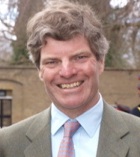
My first book, “No More Champagne”: Churchill and his Money, is due to appear within days of my sixty-fifth birthday, so this is no more than the tale of a novice’s initiation. Forty years in a busy office prepared me to concentrate, but not for a writer’s loneliness. Each morning I still try to clear the residue of this former life from my desk before firing up Scrivener, the excellent writing software that allows easy toggling between research and live chapters. When possible I write at home, in a study with fine views on three sides; I face the fourth to resist temptation. Before writing I never used to drink coffee, but now a break for a mid-morning Nespresso looms large. Soon after it, the dog starts manoeuvres at lunch for lunch and a walk. If the words are flowing freely, he may have to wait until Radio 3’s Composer of the Week has come to an end.
I have produced articles for many trade magazines, but nothing prepares one for the challenge of a first book. Distilling a million words of research into twenty-five chapters of 5,000 words required more drafts than I can possibly recall. As successive versions stripped away words and events that once seemed essential, I vetted the results a day or two later in a room that I associate with reading rather than writing. I was looking for a combination of rhythm, authority and economy, but it seemed elusive. When it finally appeared within sight, I handed over the result to my wife for a check against financial jargon and impenetrable passages, only for her red pen to run free until the publishers’ deadline approached. By then the dog had almost lost the will to live;. He for one hopes that I got writing out of my system; I think I may be hooked.
Paul Merrill
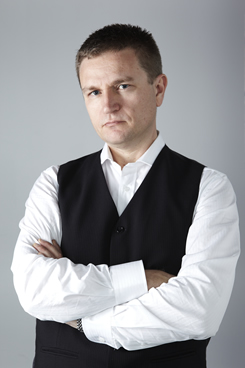
I read in Stephen King’s On Writing that he aims for 2000 words a day, so that’s always my target. I start early and re-read what I’d written the previous day and tweak it into better shape, usually ending up reducing it by about 10%. Then I plough on through the morning, being distracted every few minutes by Facebook, the dog, the need for a 15th cup of tea, emails and birdsong. I’m sadly easily sidetracked so I sit facing a blank wall in total silence as even something soothing like Peruvian pan flutes or actual white noise will get my mind wandering and misbehaving. King said that he writes listening to loud, heavy metal music, possibly helping him slip into a suitably dark place for his genre. I’m mostly attempting humour, and have yet to find anything aural that helps stimulate me. The 2000th word usually struggles heroically onto the page mid-afternoon. After that the distractions are more tangible – kids, dinners, packed lunches, neglected dog, more tea, neglected wife. As I suffer from insomnia, another window of creativity can be after everyone else (including the dog) is asleep. An hour or two in the early hours can be surprisingly constructive.
Vanessa Nicolson

It depends what you mean by ‘writing’, the physical or the mental process? For me, most of it happens in my head rather than at a desk – in the supermarket, on a walk or in a train, in the bath. Whole stories are begun and developed and concluded in my imagination before one word has been consigned to the computer. And then when I focus on remembering, it’s all gone. I berate myself for not making notes – why can’t I seem to do that? – but I think really it’s an excuse to kid myself that a work of brilliance is just around the corner. It was easy when I was writing a memoir because my story was already there. I am full of admiration for those who can invent it all and make it sound real.
It takes me a long time to get going. Pressure to produce something quickly gets me to my computer, but if a deadline is more open ended, I prevaricate. All the washing and cleaning gets done, bills are paid on time, and any distraction – a sunny day, a suggestion of a meeting in a café - is taken up. However, once I have got into the flow, I find it difficult to take a break. Hours disappear. I have been known to be typing away until late, surprising myself at the time that has flown by. I just need the right mood and conditions. My study must be neither too hot nor too cold, illuminated by a light that is not too bright nor too dim. I can’t be too hungry or too tired or distracted by noise. Because if I am I might just decide I may as well put it all off till tomorrow.
Susan Ottaway
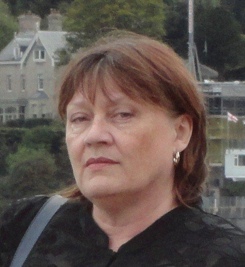
I write in a tiny study in the house I share with Nick. It is always untidy, mainly because it is too small for the hundreds of books I keep on the bookshelves and in piles on my desk and on the floor. I usually know exactly where to find what I am looking for but on the odd occasion that a book or piece of information is missing I can usually be found stomping around the house looking for it and muttering under my breath that the study is so small it’s like writing in a telephone box. It used to have a glass door but since it faces the front door of the house it was embarrassing when visitors arrived. We solved that problem, not by tidying up, but by replacing the door with a solid wooden one which is always shut at the end of a working day or when the doorbell rings. Although the study is small and cluttered it is where I’m most comfortable and I couldn’t think of writing anywhere else.
When I am at the start of a new book I usually begin writing as soon as Nick has left for work. As time passes and deadlines loom I find it hard to sleep, so often get up at around 4 a.m. and start work then. It’s always satisfying to have a few hundred words under my belt before most people are getting up. I am quite disciplined and work all day with just a short break for lunch which I take back to my desk and eat while listening to a Radio 4 short story on iPlayer. During the afternoon I read out loud what I have written during the morning as I find that I have to concentrate more on the actual words when speaking them and so can spot mistakes more easily. Much as I would like to listen to music while writing it doesn’t work for me although I do listen to 1940s music at other times for inspiration. And I don’t look for distractions as I would rather be writing than doing any other work, especially housework.
Mark Peel
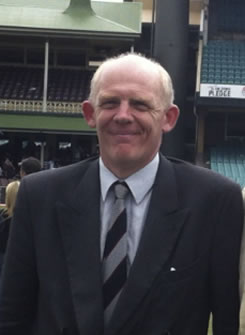
Writing, above all things, is very much down to mood. Some writers crave solitude with no distractions. I’m rather the opposite, finding that I’m often at my most productive when in company or having the Test match on in the background; failing that, a rousing piece of classical music. Another favourite ploy is to go to a coffee shop and sit through a leisurely lunch putting some thoughts to paper. Taking my pen and paper to a concert, a lecture or a church service can also bear dividends when great words and music elevate one’s thoughts. When writing at home I prefer sitting in my armchair with all my papers spread around rather than in more orderly fashion at my desk because I find this relaxes me more. Being an indifferent sleeper I tend to write better later on in the day following a bracing bout of exercise, and if the mood takes me I will happily work into the small hours. If I’m working from documentary material I like to aim for at least one thousand words a day, often more, but if I am relying more on independent thought the amount tends to be rather less. Too often I fail to meet my target, but failure at least stirs the conscience and instils in me a more rigorous work ethic. A fifty-hour week I consider reasonable; more if a deadline looms.
Monica Porter
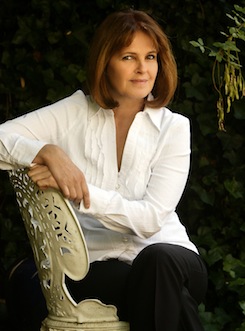
I’m disciplined, so when I am working on a book I will hammer away at it all day, concentrating completely on the job at hand, and give short shrift to any interruption. That’s when things are rollicking along. But if I’m struggling a bit, then I will find any excuse to break off and do something ‘useful’: put on the laundry, fold the laundry, go buy more food, eat it, make a cup of tea, re-heat my cup of tea in the microwave when it goes cold , sit outside in the sunlight so I don’t develop rickets. I am satisfied if I write 1,000 words a day, or just three hundred, as long as they are good ones. I’m not rigid about the hours, though. I stop when I reach a natural break in the narrative, whether that is at five o’clock, or six or seven or midnight.
Since the age of 22 I have been working at the same old-style mahogany desk with red leather top. It has moved with me to all the homes I have lived in, and always been by a window. I know some writers prefer to face a blank wall in order not to be distracted, but that would depress me. I like gazing out at trees, gardens, clouds, houses, cars going by. You can fill your eyes with the world outside your window and still keep your head focused on the world of the book you are creating. I sit in a comfortable office swivel-chair, handy for gazing in any direction.
I listen to classical music while writing serious, thoughtful stuff – Beethoven, Shostakovich, Mozart, Mahler, Rachmaninov, operatic arias. Great music is spiritually inspiring and I think stimulates the brain cells. But when writing more jocular works, e.g. snappy little newspaper articles, I listen to pop music on the radio. There was a time when background noise - traffic, neighbours, the cleaner’s hoovering - might have bothered me during writing, but my years as a feature writer in a bustling, open-plan Fleet Street newspaper office cured me of that. I can shut out any distraction if I need to. I constantly improve my words as I go along, reading and re-reading them, rather than produce entire drafts of a work in succession. It’s easy to keep polishing on a computer. Of course this doesn’t mean that I won’t change things yet again after typing The End. Whatever you write, you want to give it your best, before putting your name on it.
Nicola Stow
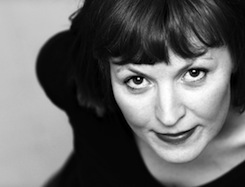
My writing routine is not how it used to be…thank God. This time last year I was working full time for a national tabloid newspaper. The hours were unpredictable, unsociable. Another day, another death-knock, constant calls from the newsdesk, filing copy from the car and thinking, I just want to get home and work on my book. Like many other writers I had to - or chose to (this is not a sob story) -fit my book writing around the day job. So I worked at night, into the early hours. On a good night I could keep going ‘til 3am. Once, when I was desperate to finish a proposal, I stayed up all night - then I had to phone in sick because I couldn’t risk driving.
I enjoyed my nocturnal writing sessions. I loved being able to work in peace without the phone ringing. But as I discovered, one can only sustain such a lifestyle for so long. I became forgetful, delirious, a nightmare to live with. I left my mobile phone in the supermarket (good riddance), found my keys in the fridge and once woke up in the broom cupboard trying to have a deep and meaningful conversation with Henry the vacuum cleaner (well, almost). The tipping point, however, came when I was trying to make a hasty exit from a door-knock - another death-knock. After being chased down the drive by an angry neighbour wielding a monkey wrench, shouting: “You f*ing filthy tabloid scum,” I jumped into my car, started the engine, and smashed into another neighbour’s wall. A couple of weeks and £250 later (payment for damaged wall), I quit my job. It was time to take the plunge and give this book-writing lark a bash.
Things are very different now. Since May I’ve been self-employed, combining freelance journalism with ghostwriting. I love it, even though my current writing routine sounds quite boring compared to how I used to work. Now I just sit at my desk and write…by day, which is a real luxury. I live in Edinburgh, in a one-bedroom flat with my lovely - and very understanding - husband, Leon. I work in our living room overlooking the castle. Not a bad view. I try to write at least 1,000 words a day although this very much depends on the kind of project I’m working on. I also like to work in silence, so I don’t really do coffee shops - far too noisy. During break times I play my piano or go for a walk. And my daily treat - apart from a bag of Haribo sweets - is to attend Body Attack classes (rock ‘n’ roll). Writing isn’t easy. I have good days and bad days and I do feel isolated at times. But I wouldn’t change my new life for anything. I’m just grateful for this opportunity. And besides, I’ll always have my Henry to help me through the lonely days.
Adrian Weale
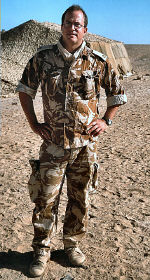
My day usually starts at 5.45am when the tea-maker goes off. After we’ve drunk a mug of tea in bed, it’s time for ‘up and at ‘em’. First task is to get our daughter awake and cajole her into getting ready for school and, with that done, my wife and I generally take the dogs up to Kensington Gardens for a walk or run, depending on how we’re feeling and what the weather is like. Once I’m back from that, and I’ve had another cup of tea, I’m usually at my desk by around 8.30, firing up the iMac and ready for the off. First things first, I usually check my email and have a quick scan through the news to see what’s going on, then I’ll open up whatever it is that I’m writing.
The first writing task of the day is to read what I did the day before and revise and correct it. With that done, it’s probably about 10am and time for a coffee, which I drink at my desk. Then into the meat of the day’s writing. My daily target is around 2000 words which will normally take me through until about 3pm. If deadlines are tight, I can normally comfortably raise this to 5000 or so, and my record was just under 12000 words in a day, finishing off the manuscript of a ‘series book’ for Channel 4 Books which I’d been given a non-negotiable three weeks to write. I wouldn’t want to do that again in a hurry, and having a long-standing dinner party to cook for in the evening didn’t help.
Writing is exhilarating on those days when the words are flowing but a bit of a grind when they aren’t. I don’t stop for lunch and I while I would like to listen to music, I can’t, as I’m an inveterate ‘singer-alonger’ and it puts me off. I’ll occasionally get up to replenish my coffee and, from time to time, my Bull Terrier Gussie will wander into the office looking to have her ears scratched, but those are normally the only interruptions during the week. When our cleaner comes in on Tuesday mornings I’m afraid I rudely shut my office door and leave her to it.
I revise and edit as I’m going along to some extent - though never enough to obviate the need for the morning revision sessions - but when I’m satisfied that I’ve reached my target for the day, I’ll down tools. That’s the point at which I will go out, either to take some exercise at the gym – usually a swim or a weight training session – or to go to Sainsbury’s to buy food for family dinner. I’m the default cook in the family and this is often the best part of the day: a chance to chat with Mary and the children, and drink a beer or two while preparing food.
That’s the ideal anyway. In reality, in my other job as an officer in the Army Reserve, I’m away from home with depressing regularity at present and so, much of the time, writing consists of snatched opportunities to sit down with my laptop late at night or early in the morning when everything is quiet. Even so, It’s surprising how it all still ‘works’.
